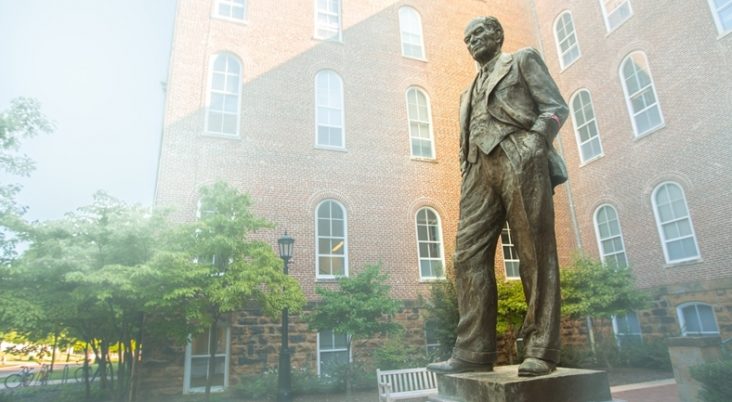Delta Grassroots Caucus calls for moving J. William Fulbright statue at UA, renaming college
by July 2, 2020 7:36 pm 1,904 views

J. William Fulbright statue on the University of Arkansas campus.
U.S. Sen. J. William Fulbright is one of Arkansas’ most renowned politicians and in the age of the Black Lives Matter movement his civil rights record is being re-examined.
The Delta Grassroots Caucus on Thursday (July 2) called for the removal of his statue on the University of Arkansas at Fayetteville campus to a museum and re-naming the College of Arts and Sciences. The caucus said it supports a campaign to educate people about his vast accomplishments, especially those in foreign affairs and his opposition to the Vietnam War, but his failures in the civil rights movement need to be noted as well.
African American students have led efforts to expand the racial justice conversation at the UA campus and removal of the statue is among their positions.
“The Delta Caucus is a highly-diverse, grassroots advocacy coalition with many African American partners, including some alumni and students with the UA system. Issues of civil rights and education in Arkansas are vital to our organization. The statue should be moved and the college re-named on the grounds that this commemoration will be interpreted as supporting or at least tolerating Fulbright’s civil rights record,” according to a statement released by the caucus.
Fulbright graduated from the University of Arkansas in 1925 and served as president of the university from 1939-1941.
It was noted that Fulbright, a Democrat who represented Arkansas in the U.S. Senate from 1945-1975, signed the Southern Manifesto, remained silent in the face of Gov. Orval Faubus’ effort to block desegregation at Little Rock Central High in 1957, and voted against and took part in filibusters against civil rights legislation even at the late dates of 1964-65.
Despite his record on civil rights issues, he was considered one of the most progressive senators of his era which began when he was first elected in 1944.
He founded the Fulbright Scholarship international exchange program that has awarded grants to over 390,000 scholars in more than 160 countries. He opposed the witch hunts imposed by U.S. Sen. Joe McCarthy and he advised President John Kennedy against the Bay of Pigs invasion in 1961. Fulbright might be best known for his rigorous opposition to the Vietnam War.
Letters that Fulbright wrote to constituents emphasized that Brown vs. the Board of Education was the law of the land and he expressed approval of early desegregation in Charleston and Fayetteville. He supported the nomination of Thurgood Marshall to the Supreme Court in 1967, and voted for the extension of the Voting Rights Act in 1970. He played a crucial role in defeating President Richard Nixon’s nomination of the racist Harrold Carswell to the U.S. Supreme Court in 1970 at a time when most Southerners supported Carswell.
Delta Grassroots Caucus director Lee Powell is the author of a scholarly biography of Fulbright, “J. William Fulbright and His Time,” which is sharply critical of the senator’s civil rights record.
“We have been surprised at how little so many people know about Fulbright’s record. They often seem to think that he inflamed racism and hatred like an Orval Faubus, James Eastland or George Wallace, but of course that was just not his record — this is not to defend the senator but to point out that he should not be lumped together with Confederate traitors or those who led the charge for racism,” Powell said.
“I debated these issues with him for 20 years and the reason so many progressives were deeply disappointed by his civil rights record was precisely we believed he was not a racist, but someone from whom far better leadership was expected but never emerged. The segregationist pressures of his time should be acknowledged, but not as late as 1964-65. He should have done far better,” Powell added.
